Pants, Posture, and a Pain in the Back
As we transition from the winter months into spring, many of us will search in our wardrobe for lighter weight clothing and perhaps some lighter colors. One thing we often overlook when it comes to choosing clothing is how it affects our posture—including whether it risks giving us back pain, or helps to resolve it.
In this blog post I would like to consider two main posture criteria when choosing pants:
- Do the pants allow healthy pelvic anteversion, or do they tuck your pelvis?
- Do the pants allow healthy bending from the hips?
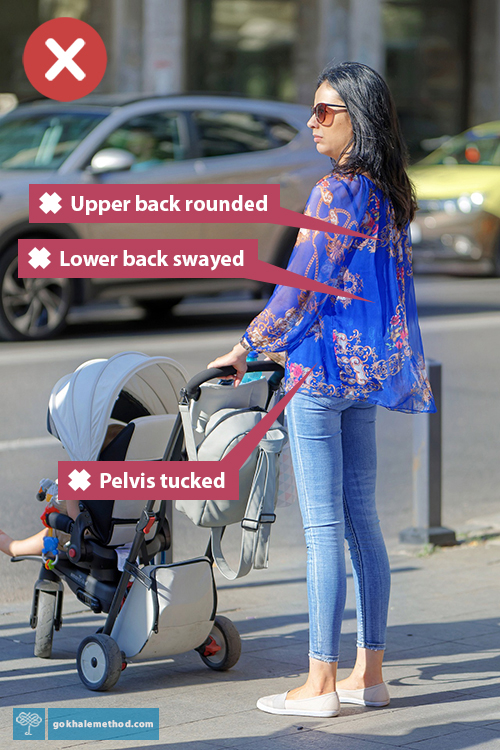
Tight-fitting jeans and pants may restrict the hips and tuck the pelvis. Pixabay
Do your pants allow for a healthy pelvic position, or tuck your pelvis?
Tucking the pelvis has been perpetuated by the fashion industry for over a century. Since the 1920s many modern clothes have been designed and modeled to reflect this fashionable pose, which has now become common in our culture. Unfortunately a tucked pelvis:
- Compresses your L5-S1 disc and nerves
- Compresses your pelvic organs
- Distorts your hip joints
- Rounds your upper body forward and/or sways your back
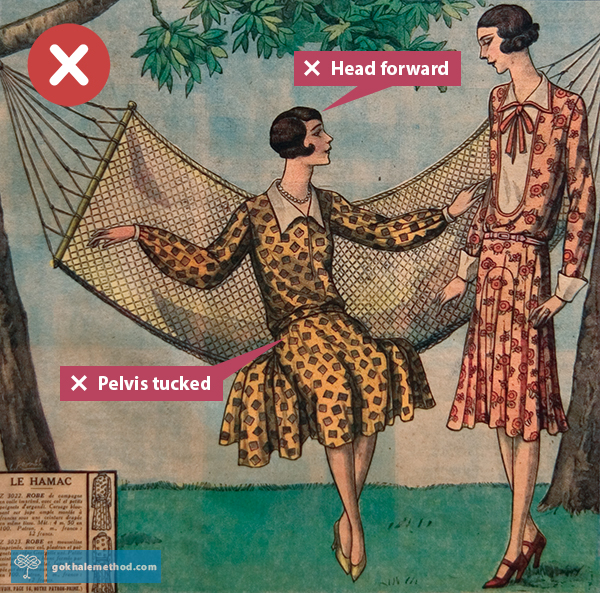
This French fashion magazine cover from the 1920s shows the new “relaxed” posture which translates as tucking the pelvis and slumping.
How fashion pants are cut to tuck
In the case of jeans and fitted pants, cutting them with less fabric in the rear means that the gluteal muscles don’t have enough room to settle naturally behind and the pelvis is forced into a tuck. With the glutes more underneath than behind (they are called your “behind” for good reason!), these muscles are mechanically disadvantaged. They will consequently work less well to propel you forward in walking, which causes a loss of muscle mass and a weaker, flatter butt. As clothing manufacturers then produce pants to fit this shape, the cycle is perpetuated.
Dress pants are usually designed to hang best on a tucked or retroverted pelvis, albeit less severely tucked than with tight jeans. They are usually tailored with a horizontal waistband. In the Gokhale Method® we teach that a naturally well-positioned pelvis is anteverted, which is best matched by a waistband that angles down slightly in the front, and a cut that is roomy behind.
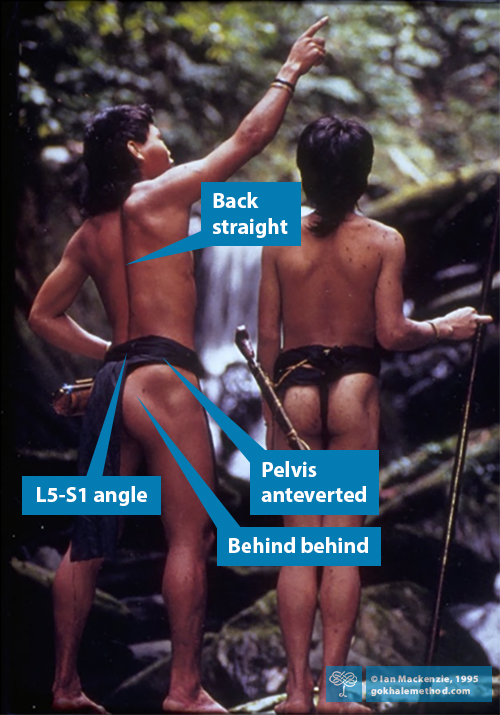
Children, our ancestors, and people in traditional societies such as these Ubong tribesmen from Borneo, have the pelvic anteversion that is natural for our species—and report remarkably low levels of back pain.
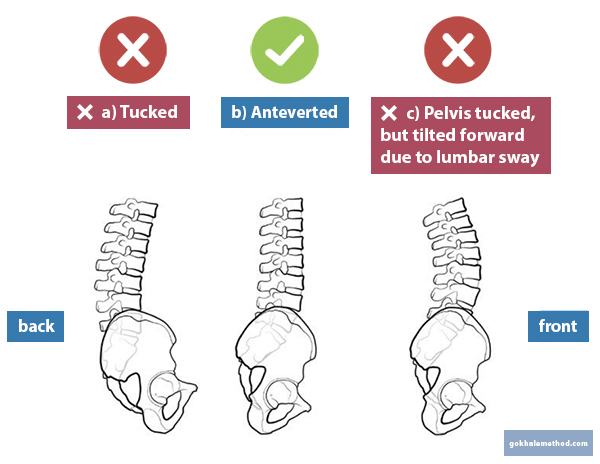
A tucked pelvis (a) compresses the front of the lower lumbar discs, and stretches the muscles and ligaments of the back. An anteverted pelvis (b) angles down at the front allowing the lower back to stack straight. This requires a healthy angle at the L5-S1 junction at the base of the spine.
Tilting the pelvis forward without a healthy L5-S1 (c) sways the back and compresses the back of the lumbar discs.
Choose pants that are designed to allow movement
In general, activewear such as pants for yoga, climbing, hiking, and horse riding will be better cut than fashion wear and allow for anteversion of the pelvis. Horse riding pants often have a generous amount of fabric in the seat as this sport generally encourages a high level of activity in the glutes and includes healthy instruction on pelvic position.
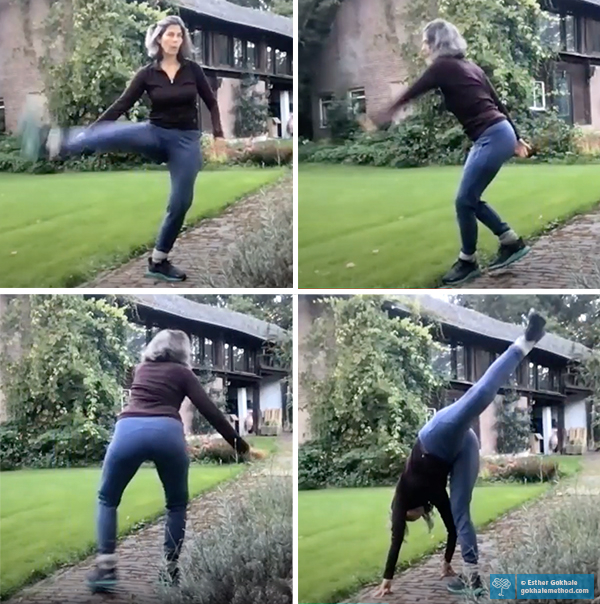
Two of Esther’s favorite pants are horse riding pants, manufactured by Horze. They are ideal for Gokhale Exercise sessions. (1-2-3 Move, Freedom in Clothing, September ‘22.)
Unfortunately, even clothing designed for exercise can reflect the same unhealthy form that dominates the fashion industry. Don’t assume that just because a pair of pants or leggings are sold for fitness and made from stretchy fabric that they won’t nudge you into a tuck.
We find many of our students have been misguidedly coached to maintain a tucked pelvis, especially in weight training and certain ab exercises. These students, eager to remain active but desiring to lose poor posture habits, respond especially enthusiastically to the cues we teach in our in-person Foundations course, one-day Pop-up course, and our online Elements course, and are able to maintain good posture habits in our Gokhale Exercise program.
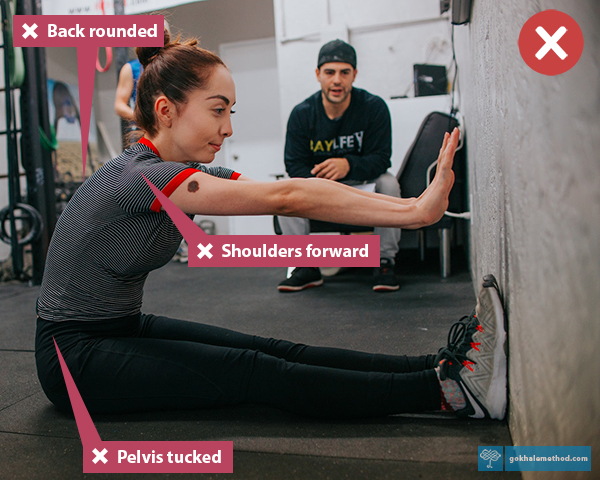
Exercises done with a tucked pelvis and rounded back will reinforce poor postural habits and can damage the spinal discs and ligaments. Pexels
Do your pants pass the hip-hinge test?
Whenever you try a new pair of pants, give them the “hip-hinge test”. Hip-hinging is the way that you instinctively bent as a young child, and it is the way your ancestors bent. It continues to be used by people living in traditional societies around the world. Hip-hinging describes a forward bend that happens at the hips as the pelvis rotates on the thigh bones while the back remains straight, as opposed to a bend that happens in the spine and rounds the back.
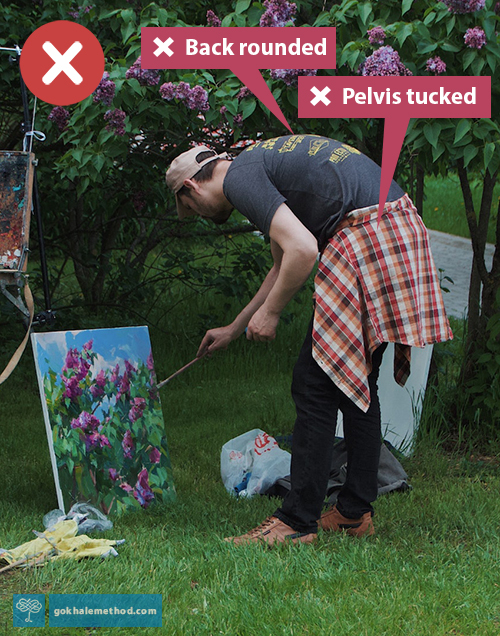
This painter is tucking his pelvis and rounding his back to bend. Pexels
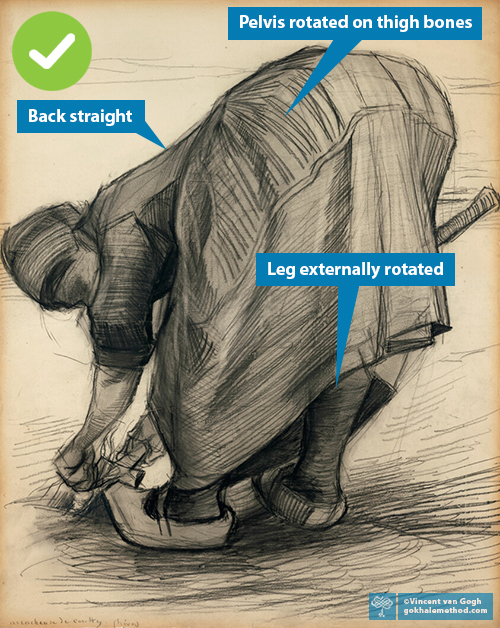
This woman’s clothing allows her to externally rotate her legs, rotate her pelvis on her thigh bones, and keep her back straight. Drawing by Van Gogh, The Carrot Puller, 1885. Arctic
The major benefits of hip-hinging are that it preserves the spinal discs and nerves, mobilizes and lubricates the hip joint, and preserves natural hamstring length. By contrast, rounding the back damages the spinal discs, nerves, and ligaments, allows the hips to stiffen, and permits the hamstrings to adjust to a short resting length.
In my field research and teaching, I see a strong correlation between those who bend well and those who live pain free well into old age, while those who round their backs often experience pain no matter how young they are. I’ve found that traditional and ancestral clothing tends to be looser to allow the freedom of movement needed to hip-hinge.
These traditional hand embroidered Yao pants from the highlands of Thailand have a gusset in the center, allowing plenty of room for bending and stretching. (Alumni Live Chat, February ‘22.)
The hip-hinge test has two criteria—you want freedom of movement, plus you don’t want your intergluteal cleft (otherwise known as butt crack!) to be exposed.
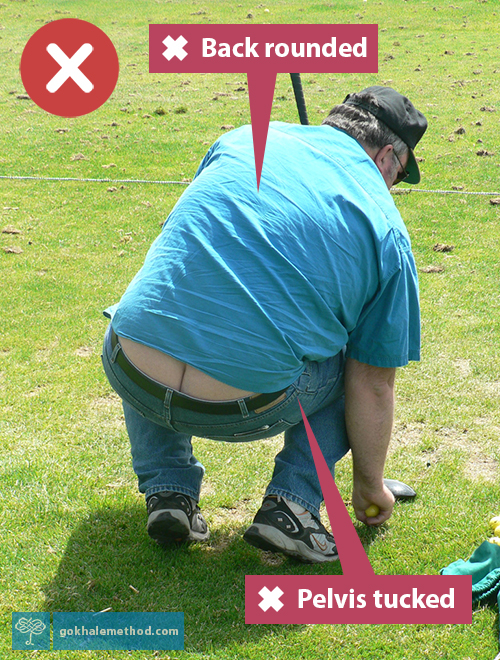
It’s easy to spot when pants don’t allow enough room for bending and encourage the pelvis to tuck! Flikr
Having discovered the benefits of hip-hinging, many students find they no longer want to settle for restrictive pants or jeans. They usually consider getting rid of these items a good trade-off for the pain relief and increased function that comes with this change.
Are some brands better than others for healthy posture
It’s our company’s goal that one day unhealthily cut pants will not be viable in the marketplace—but we will need a few more years to get there! In the meantime, when you do find a really good fit, you might want to consider buying additional pairs to future-proof yourself against the vagaries of fashion.
I generally steer clear of recommending brands because their styling can change. Also, what fits one person well may not work for another. That said, please comment below if you have a favorite brand or style that you have found to be posture-friendly.
Best next action steps for newcomers
If you would like insight on your posture, consider scheduling an Initial Consultation, online, or in person.
You can sign up below to join one of our upcoming FREE Online Workshops. . .

Comments
Kuhl jeans (not skinny cut)
Kuhl jeans (not skinny cut)
These are made for adventuring. Generous cut and plenty of stretch for movement. I buy mine at Scheels. If you find them, buy a few pairs...they sell out often...even from the Kuhl website!
I have also had great luck
I have also had great luck with Kühl pants if they are not skinny cut. Get the boot cut or relaxed styles. I've gotten jeans, hiking pants, travel pants, linen cotton pants. I have a "curvy" size 10 body and these fit me quite well. Believe it or not, I also have had great luck with Walmart Levis CURVY bootcut jeans. Unfortunately, after buying them for 10 years and being asked if they are "designer" jeans because they fit me so well, when I tried to reorder recently they seem to be discontinued. Regular Levi's curvy can sometimes work but they cost $60-$75 vs $20 for the Walmart ones. Underwear can also be a problem for causing pelvis tilt. Not cut full enough in the fanny!
Trousers designed for
Trousers designed for climbing is what I enjoy! Patagonia even had some with an office-y look. And E9 had some that are especially comfy to me - I stocked up :-)
Try different sizes.
Question: what pants does
Question: what pants does Eric wear?
Wonderful article, thank you!
Wonderful article, thank you! The Thai pants caught my eye, because over the years I have bought many from various parts of Thailand and I wear them around the house frequently. In Thai they are often called gang-gaeng-leh, "fisherman pants", but nowadays people from every walk of life and every region wear them for comfort, the way we wear sweat pants in the West. They may have evolved from similar Burmese pants. (Male Thai classical dancers also wear a version of these pants - you're right that the gusset allows for a very wide range of movement). The drawstring that holds together the folds of the wide waist is what makes these pants such an amazing unisex piece of clothing :)
Add New Comment
Login to add commment
Login